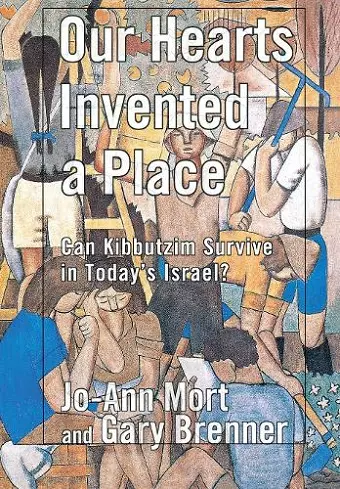Our Hearts Invented a Place
Can Kibbutzim Survive in Today's Israel?
Gary Brenner author Jo-Ann Mort author
Format:Hardback
Publisher:Cornell University Press
Published:27th Aug '03
Currently unavailable, and unfortunately no date known when it will be back

"We thought we were living in a society of the future, showing how people can live together in a way that the human being is not a product of society where you have to put somebody down so that you are up.... Suddenly we [find] that people want to be more like outside, and we are disappointed."
"When people say to me, 'We're so sorry to see what's going on in the kibbutzim because we are losing the most important thing that happened to the State of Israel,' I say to them, 'Listen....' The government lost interest in the kibbutz movement, and we had to find another way. The State of Israel slowly but surely became a normal state, and the pioneers finished their job. We are living in a new era. We have to make the adjustment."—from Our Hearts Invented a Place
One of the grand social experiments of modern time, the Israeli kibbutz is today in a state of flux. Created initially to advance Zionism, support national security, and forge a new socialist, communal model, the kibbutzim no longer serve a clear purpose and are struggling financially. In Our Hearts Invented a Place, Jo-Ann Mort and Gary Brenner describe how life on the kibbutz is changing as members seek to adapt to contemporary realities and prepare themselves for the future. Throughout, the authors allow the members' often-impassioned voices—some disillusioned, some optimistic, some pragmatic—to be heard.
"The founders [of the kibbutz] had a dream," an Israeli told the authors in one of many interviews they conducted between 2000 and 2002, "[which] they fulfilled... a hundred times." The current generation, he explains, must alter that dream in order for it to survive. After tracing the formidable challenges facing the kibbutzim today, Mort and Brenner compare three distinct models of change as exemplified by three different communities. The first, Gesher Haziv, decided to pursue privatization. The second, Hatzor, is diversifying its economy while creating an extensive social safety net and a system of private wages with progressive taxation. In the third instance, Gan Shmuel is attempting to hold on to the traditional kibbutz model.
In closing, the authors address the new-style urban kibbutz. Their book will provide readers with a deeper understanding of the kibbutz—and of...
Mort and Brenner believe that the kibbutz movement is still viable. While they recognize that the desires of the individual have trumped those of the community, they still found the 'commitment to collective responsibility for health, education, and welfare very much alive' and that members of the kibbutz 'still largely share a desire to make the world better.' However, they say, the classical kibbutz model needs to be replaced if kibbutzim are to survive.
* The Reporter *Enthusiasm for this unique Israeli institution seems to have diminished greatly in the more than 40 years since my own personal experience. Authors Mort and Brenner have conducted a meticulous study of the movement and report in their well-written and absorbing book that the kibbutz in Israel, with rare exception, is in a perilous decline these days.
* The Post and Opinion *It will tell you about Israel, enlighten you about the present state of the kibbutz and disabuse you of the notion that Marxist socialism is a practical remedy for the world's ills.... A refreshing candor characterizes the authors' statements about Israel and the kibbutzim they identify.
* Israel Horizons *Our Hearts Invented a Place addresses the changes taking place today by way of case studies of three of the country's 287 kibbutzim: Gesher Haziv, Hatzor, and Gan Shmuel, each representing a different trend.... Mort and Brenner's book is an important one, and the first I know of that deals with the privatization process, which was greeted by opposition from every quarter when it began a decade ago, but could nevertheless not be stopped.
* The Jerusalem Report *The authors of Our Hearts Invented a Place... suggest... that in the absence of exceptional times that inspire people to transcend themselves in the service of overriding social goals—in the case of Israel, the building of a new nation and efforts to create a more just society—materialism trumps idealism.
* New York PreISBN: 9780801439308
Dimensions: 229mm x 152mm x 24mm
Weight: 907g
232 pages